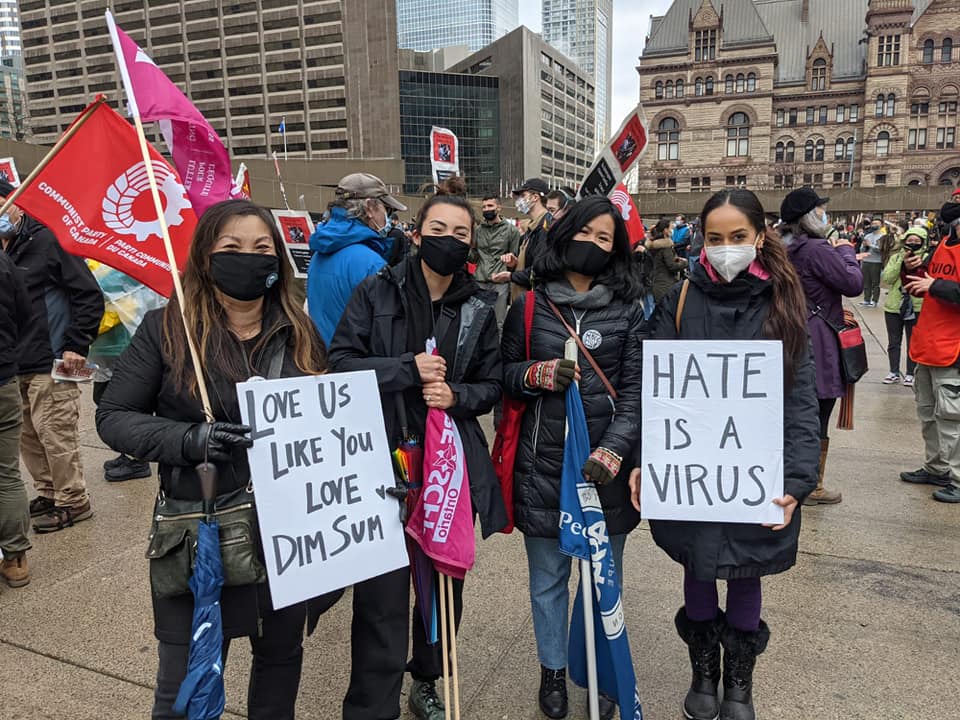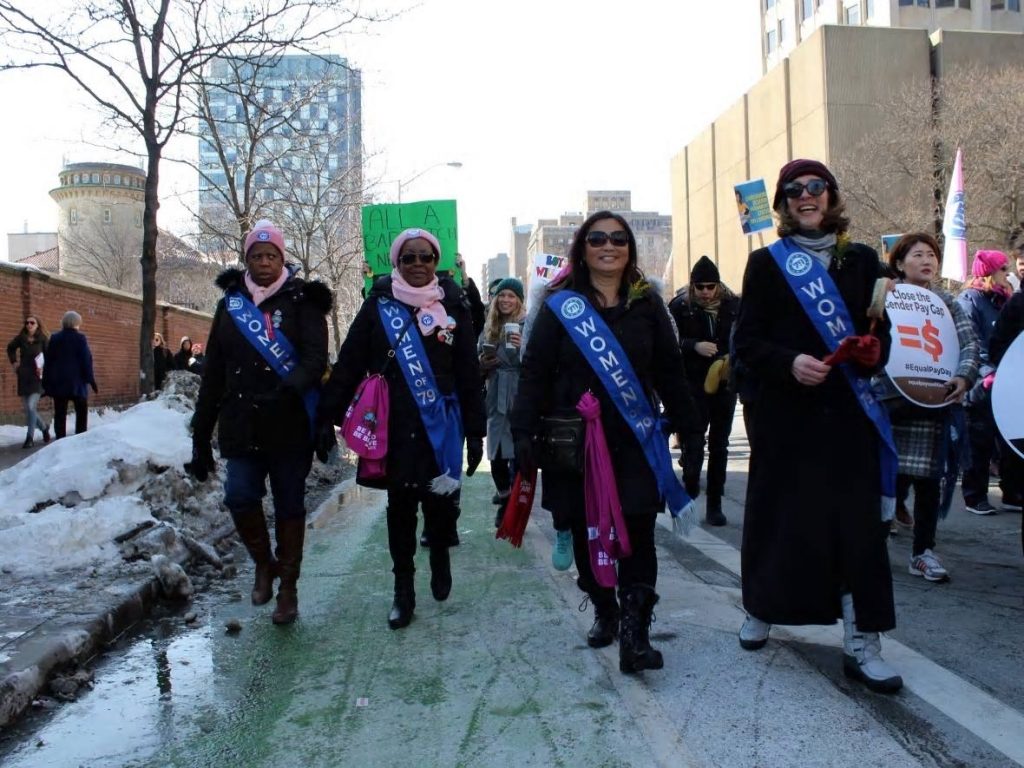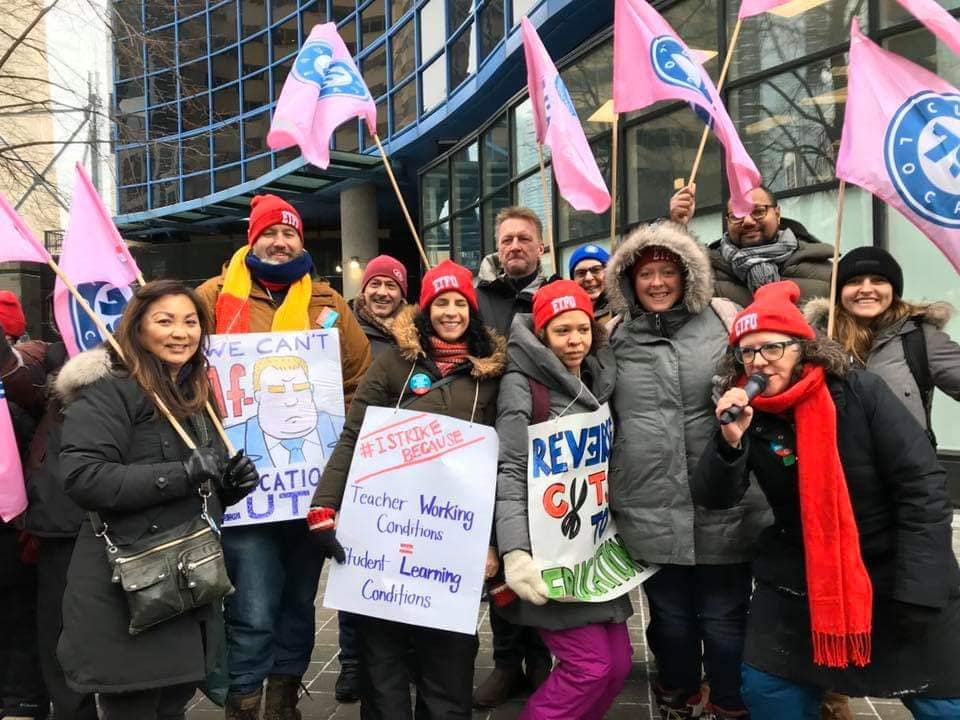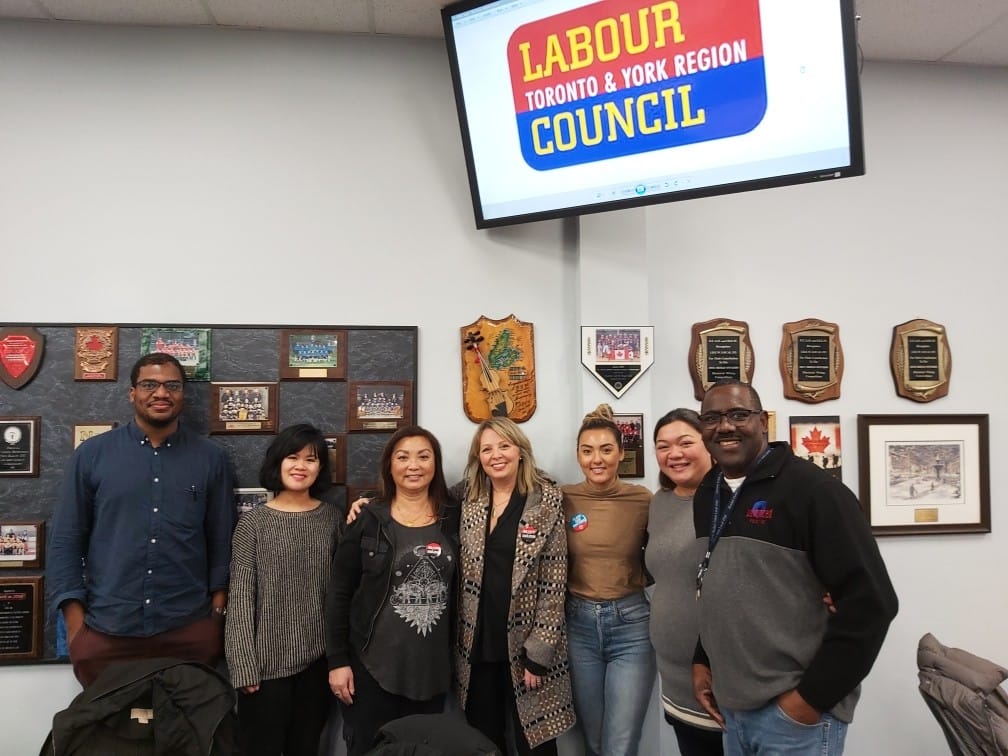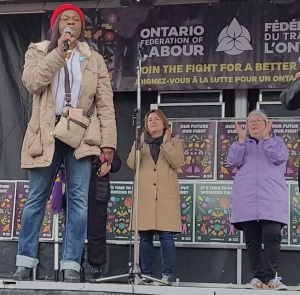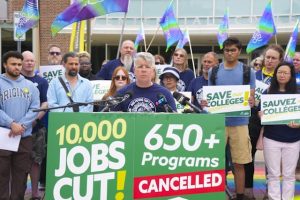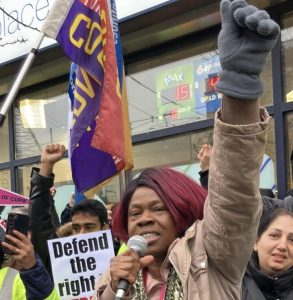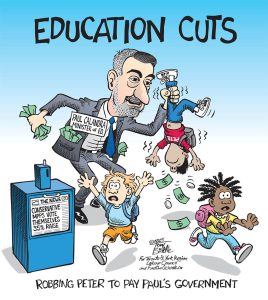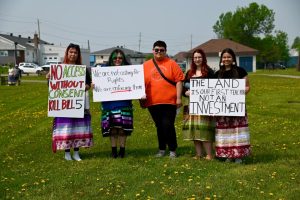常元傳:我被告知,我不像他們認識的華人
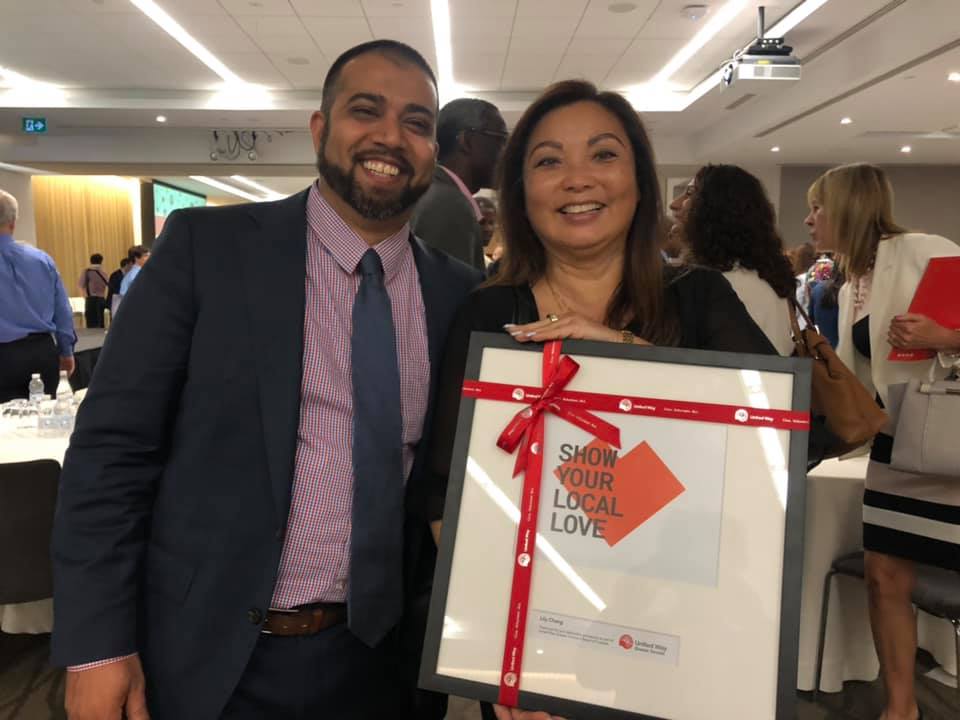
請你自我介紹,你是誰,你的日常工作是什麼?
我叫常元傳 (Lily Chang下圖左),我想說我是「台灣製造」的。 我兩歲時移民到加拿大,大部分時間都生活在多倫多。父親從薩斯喀徹溫大學 (University of Saskatchewan) 獲得研究生獎學金先到來, 母親、弟弟和我很快就跟著來了。我經常發現要平衡父母的期望,同時又要適應加拿大的朋友,這是一個挑戰。 身為四兄弟姐妹的老大,我有責任在成長過程中突破界限。
我是加拿大公共雇員工會分會79(CUPE Local 79)的執行委員會委員。79分會代表多倫多市政府、博康醫院 (Bridgepoint Health) 和多倫多社區住房 (TCH) 的22,000名工人。我在多倫多市政府的基本工作是多倫多就業和社會服務部的個案工作者。我當選執委後,向市府請了「工會假」全職服務工會。我參與了集體合同談判、解決申訴、勞資管理會議,以及協助同事處理工作場所的所有問題。我在工會的職位並使有機會成為多倫多及約克區勞工議會 (TYRLC) 代表和公益金 (United Way) 理事會成員。
你是如何參加了工運
當我受雇於前多倫多大都會為個案工作者時,同事對工會非常不滿。我們的工資比省級個案工作者少1萬元。我聽說我們正在等待平等薪酬的裁決,但當我試圖找出為什麼會延遲時,發現雇主指責工會而工會指責雇主。我申請成為工會幹事,並開始與其他人開會,就該做什麼事制定策略。
在那些日子裡,工會領導層可能把我看成一個「煽動者」。當選出新主席後,我被任命為總選舉主任,我想這是為了限制我的政治活動。我接受了任命。在1998年多倫多六市合併後,我接受了另一個職位,加入了工資協調委員會。做了12年幹事,我被邀請在2003年的工會選舉中競選一個職位。當時我的孩子已經上學了,我有時間開始參加工會會議和年會議/全國代表大會,所以我同意了。此後,我擔任工會司庫13年,擔任我的談判單位執行委員6年。
你的生活中是否發生過這樣的事件,激發您渴望為自己和他人追求正義? (例如罷工,工作中的歧視,不公平待遇等)
我大學畢業後不久,被辛力嘉 (Seneca College) 學院聘為招生辦公室職員。當時我是 安省公共服務雇員工會分會561 (OPSEU 561) 的成員, 但除了知道工會會費從我的工資中扣除之外,對我的工會瞭解不多。那時,我申請晉陞,雖然我是合格的資深候選人,但沒有成功。我向人力資源部尋求幫助,但他們沒有給我任何答案,所以我寫信給通才教育學院院長的招聘經理,並要求給予一些建設性的評論。他說他不會那樣做,並問我是否想要一頁紙的侮辱。他還說:「你可以把它帶到工會,看看他們能做些什麼。」這是挑戰……我轉向工會尋求幫助, 工會幫我提出申訴。在此之後,我的上司(教務主任)院長的朋友,開始對待我有所不同。當我為自己尋求公平時,我開始瞭解工會在捍衛和促進工人權利方面所起的作用,所以我申請成為工會幹事。我總是記得當時工會的支援對我有多麼重要。
你如何看待工會在爭取工作場所正義或社會公義方面的幫助?
雇主承認工會是雇員的談判代理人,因此工會有責任在工作場所維護其成員。工會原則以資歷、公正和平等為基礎。從工作場所正義走向社會正義是自然而然的進步。工會應成為社會正義運動的領導者,不僅僅是為提升他們的成員,也為所有工人,並要求所有工人享有權利和福利。工會可以進行教育、倡導和遊說。
加拿大華人社區應該了解加拿大工會的哪些其他相關信息?
工會是民主的:我們選舉我們的領導。 我們帶給所有加拿大人享受的東西,如產假、健康和安全立法、醫療保險、失業救濟金和周末。
在你看來,是什麼原因阻止了華裔加拿大人參加勞工/工會運動?
在勞工運動中,我沒有看到很多長得像我的人。 華人經常長大後努力工作,不想惹麻煩。如果我們在工作中有不滿意的地方,很少挑戰我們的上司:相反,我們默默忍受,或者只與對工作場所沒有責任的朋友和家人訴說。我以前被告知,我不像他們認識的其他華人,因為他們很安靜,我會直言不諱。
你對有興趣參加工會運動的人有何建議,應該從何處開始?
有興趣參與勞工運動的人,他們可以首先從參加工會活動開始,如社交活動、勞動節遊行、國際婦女節集會和遊行,以及閱讀工會通訊和參加會員大會。
然後,他們應該申請成為工會幹事。 我的工會對我們的幹事有非常嚴格和實用的培訓。培訓不僅包括如何代表某人參加申訴會議,還包括人權與公平、健康與安全和工作場所調解,甚至記筆記和公開演講。對我來說,工會工作是艱苦的工作,而這工作並不是太適合那些希望贏得所有鬥爭的人。但是,這也是有益的和令人滿意的時候,特別是每當你得到一個勝利。 當你幫助他們時,成員總是很感激,你知道你已經改善了某人的生活。
Lily Chang: I have been told that I am not like other Chinese people they know
1. Tell me a bit about yourself, who are you and what is your day job?
My name is Lily Chang and I like to say that I was “made in Taiwan”. I immigrated to Canada at age two and have lived most of my life in Toronto. My father arrived first on a post graduate scholarship from the University of Saskatchewan. My mother, brother and myself soon followed. I often found it a challenge to balance the expectations of my parents but also fit in with my Canadian friends. As the eldest of four siblings it fell upon me to push the boundaries while growing up.
I am an Executive Officer with the Canadian Union of Public Employees (CUPE) Local 79, representing 22,000 workers at the City of Toronto, Bridgepoint Health and Toronto Community Housing. My base job with the City is a Caseworker for Toronto Employment & Social Services. As an elected Unit Executive Officer, I am on a fulltime book-off from the City. I am involved in collective bargaining, grievance resolution, labour/management meetings and assist members with all matter of workplace
issues. My union position has also led to other opportunities such as Labour Council delegate and United Way Trustee.
2. How did you find yourself in this field?
When I was hired by the Former Metro Toronto as a Caseworker, my coworkers were very unhappy with the union. We were paid $10k less than provincial caseworkers. I heard we were awaiting a Pay Equity decision but when I tried to find out what was the delay, the employer blamed the union and the union blamed the employer. I signed up to be a steward and along with some others, started meeting and strategizing about what to do. The union leadership probably saw me as a rabble-rouser in those days. When a new President was elected, I was offered the appointment of Chief Returning Officer – I think this was meant to curb my political activities. I accepted and then was offered another position to work on a Wage Harmonization Committee following the City of Toronto amalgamation in 1998. After 12 years of stewarding, I was asked to run for a position in our 2003 general elections. My kids were now school age and I had the time to start participating in union meetings and conferences/conventions so I agreed. Since then, I have served as Treasurer of my union for 13 years and as Unit Executive Officer for 6 years.
3. Was there an incident in your life that sparked a desire for you to pursue justice for yourself and for others? (e.g. strike, discrimination at work, unfair treatment, etc)
Yes, shortly after I graduated from University, I was hired as an Admissions Officer for Seneca College. I was a member of OPSEU 561 but didn’t really know much about my union other than that union dues were being deducted from my pay. Then I applied for a promotion and was not successful though I was the senior qualified candidate. I tried to get help from Human Resources but they couldn’t give me any answers, so I wrote to the Hiring Manager who was the Dean of Liberal Studies and asked for some constructive criticism. He said he wasn’t going to do that and asked if I wanted a page of insults. He also said “You can take it to the union and see what they can do about that.” It was a challenge… but I did seek help from my union. The union helped me file a grievance. Following this, my manager (Registrar) who was friends with the Dean, started to treat me differently. As I pursued fairness for myself, I began to understand the role the union played in defending and advancing workers’ rights so I signed up to be a steward. I always remember how much my union’s support meant to me at that time.
4. How do you see unions helping in the fight for workplace justice or social justice?
Unions are recognized by the employer as the bargaining agent for their employees so it is incumbent upon the union to advocate for their members in the workplace. Union principles are based on seniority, fairness and equity. It is a natural progression to move from workplace justice to social justice. Unions should be leaders in the social justice movement, raising the floor for all workers, not just their own members and demanding rights and benefits for all working people. Unions can educate, advocate and lobby.
5. What other relevant things should the Chinese-Canadian community know about Canadian unions?
Unions are democratic; we have elections for our leadership. We have led the way for things that all Canadians enjoy, such as maternity leave, health & safety legislation, medicare, unemployment benefits and the weekend.
6. In your opinion, what prevented Chinese-Canadian to participate in the labour/union movement?
I don’t see a lot of people who look like me in the labour movement. Chinese people are often brought up to work hard and not cause trouble. If we are unhappy at work, we rarely challenge our superiors; instead we suffer in silence or only share with friends and family who are not responsible for the workplace. I have been told before that I am not like other Chinese people they know because they are quiet and I speak up.
7. What would you recommend for people who are interested in participating in union actions, where to start?
They could start by participating in union activities such as social events, Labour Day, IWD and rallies as well as reading their union communication and attending General Membership meetings.
Then they should sign up to be a union steward. My union has a very robust training for our stewards. The training is not only about how to represent someone in a grievance meeting but also about Human Rights & Equity, Health & Safety & workplace accommodation and even note-taking and public speaking. To me, union work is hard work and not for anyone who expects to win all the fights. But, it is also rewarding and satisfying, particularly whenever you get a win. Members are always so grateful when you help them and you know you have made a difference in someone’s life.
